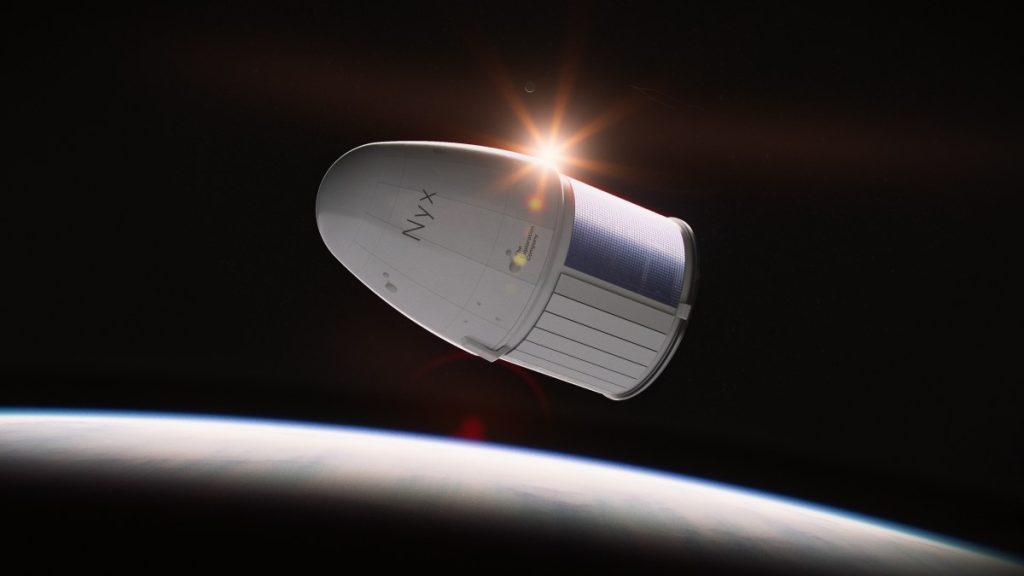
The Exploration Company raises $160 million for Nyx cargo vehicle (Image Credit: Space News)
BERLIN — The Exploration Company has raised $160 million to support the company’s development of a cargo spacecraft to support future commercial space stations.
The company announced Nov. 18 the Series B round, led by European venture capital funds Balderton Capital and Plural, along with participation from several other new and existing investors. The participants include two European sovereign funds, France’s French Tech Souveraineté and Germany’s DeepTech & Climate Fonds.
The Exploration Company says the funds will support the development of its Nyx spacecraft, designed to transport cargo to and from low Earth orbit and, later, to cislunar space. The LEO version, Nyx Earth, can transport four tons of pressurized and unpressurized cargo to orbit and return with up to three tons of cargo.
“Over the past 12 months, we have hit major operational and financial milestones and signed significant service contracts with both space agencies and commercial clients,” said Hélène Huby, chief executive and co-founder of the company, in a statement announcing the round. “This new funding is the next step in scaling up our ambitions.”
Those milestones include winning one of two contracts from the European Space Agency in May to begin studies of a cargo transportation vehicle. The contract, worth 25 million euros ($26.4 million), covers design work on a vehicle to transport cargo to and from the International Space Station. If ESA secures funding for later stages of the program at its next ministerial meeting in late 2025, it could lead to a demonstration mission to the ISS in 2028.
In July, The Exploration Company launched its first spacecraft, a reentry demonstrator called Nyx Bikini on the inaugural Ariane 6 flight. However, the company was unable to test the spacecraft’s ability to survive reentry when the final burn of the Ariane 6, intended to deorbit the stage, failed. Nyx Bikini remains in orbit, still attached to the upper stage.
The company shrugged off the setback. “While we did not gather the expected reentry data, this is not a problem for our next flights,” the company said in a social media post, noting that future spacecraft will use a different thermal protection system that has already been tested on the ground.
“We got some great data to begin with and we derisked a lot of what needed to be derisked,” Dana Baki, chief commercial officer of The Exploration Company, said of the mission in a presentation at the ISS Research and Development Conference in August.
The next flight for The Exploration Company is of a mid-sized capsule, called Mission Possible, scheduled for the middle of 2025 on a SpaceX Falcon 9. That capsule will spend three hours in orbit before splashing down off the coast of Hawaii. Baki said the capsule will have 300 kilograms of cargo from space agencies and companies seeking to perform science experiments or technology demonstrations on the brief flight.
While Nyx Earth will initially go to the ISS, the company is targeting commercial space stations as its main clients. It has announced contracts with Axiom Space, Starlab Space and Vast for transporting cargo to and from their planned space stations. Baki said The Exploration Company has a backlog of more than $750 million with both those companies and with space agencies.
The Exploration Company said the $160 million it raised is the largest Series B round to date by a space company in Europe, bringing the total it has raised to $230 million. Publicists for the company often claim that it is the largest space company in Europe, although the 200-person firm is smaller than some other startups and a fraction of the size of stalwarts like Airbus Defence and Space, OHB and Thales Alenia Space.
Huby emphasized the company’s European roots in the statement announcing the round, noting that 98% of its shareholders are European, “demonstrating that the continent can finance bold entrepreneurs.”
“The Exploration Company is poised to redefine European leadership in space exploration,” said David Thévenon, partner at Balderton Capital, in a statement. “Their mission to make space exploration more accessible and sustainable promises to unlock unprecedented opportunities not just for Europe, but for humanity’s future in space.”








